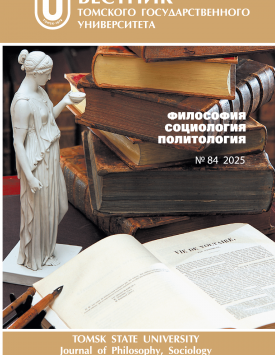Transformation of ideas about digital literacy and russian specifics
The creation of new information and communication technologies at the turn of the 21st century required the formation of new skills for working with an ever-increasing amount of information, as well as a deep knowledge of the nature of digital technologies. Under these conditions, the concept “digital literacy” was introduced into scientific discourse, designed to reflect the ongoing changes in perceptions of literacy in the digital age. The high dynamics of the development processes taking place in the field of digital technologies, the involvement of an increasing number of countries with different economic, social, and intellectual potential in this area necessitate the improvement of our understanding of what is happening and requires further study of ideas about digital literacy. The aim of this study is to identify the main trends in the transformation of ideas about digital literacy in both foreign and domestic research. In the course of this study, analytical and comparative methods were applied, the combination of which allows identifying the features of the approaches under consideration in relation to the interpretation of digital literacy, achieving the best understanding of the processes taking place in modern society, as well as obtaining results that can have practical significance related to finding invariant requirements for this type of literacy, which can be used in the work to improve educational programs in the field of computer science. The study revealed several key trends in modern digital literacy research, which manifest themselves in the further development of standardized definitions, including an indication of a particular set of knowledge and skills that define national and international standards of digital literacy, and in the actualization of the desire to rethink school literacy in accordance with changing information and communication technologies. It was found that in Russian research on information literacy, there is a tendency to analyze the concept “digital literacy” in connection with the development of the so-called digital economy and consider it in conjunction with the concept “financial literacy”, which is somewhat at odds with those areas of digital literacy research that are being developed by foreign scientists. It was established that the further development of digital technologies raises additional questions for researchers and forces them to look for new approaches to conceptualizing ideas about digital literacy. The authors declare no conflicts of interests.
Keywords
digital competence,
digital technologies,
digital literacyAuthors
| Chmykhalo Alexander Yu. | Tomsk Polytechnic University | sanichtom@tpu.ru |
| Zharkova Marina A. | Tomsk Polytechnic University | mma1252@tpu.ru |
Всего: 2
References
Шариков А.В. Концепции цифровой грамотности: российский опыт // Коммуникации. Медиа. Дизайн. 2018. Т. 3, № 3. C. 96-112.
Кузьмин Е.И., Жилаеская И.В., Игнатова Д.Д. Медийно-информационная грамотность в России: дорога в будущее. М. : МЦБС, 2014.
Веселовский М.Я., Измайлова М.А., Абрашкин М.С. Приоритеты и главные инструменты развития цифровой экономики России // МИР (Модернизация. Инновации. Развитие). 2018. Т. 9, № 2 (34). С. 192-199.
Kress G. Literacy in the new media age. Routledge, 2003.
Sheridan M.P., Rowsell J.M.K. Design literacies: Learning and innovation in the digital age. 2010.
Jenkins H. Confronting the challenges of participatory culture: Media education for the 21st century. The MIT press, 2009. 145 p.
Gauntlett D. Making is connecting. John Wiley & Sons, 2013.
Burnett C., Merchant G. Is There a Space for Critical Literacy in the Context of Social Media? // English Teaching: Practice and Critique. 2011. Vol. 10, № 1. P. 41-57.
Cazden C. et al. A pedagogy of multiliteracies: Designing social futures // Harvard educational review. 1996. Vol. 66, № 1. P. 60-92.
Alvermann D.E. Media, information communication technologies, and youth literacies: A cultural studies perspective // American behavioral scientist. 2004. Vol. 48, № 1. P. 78-83.
Buckingham D. Media education: Literacy, learning and contemporary culture. John Wiley & Sons, 2013.
Sefton-Green J. Chapter 8 Youth, Technology, and Media Cultures // Review of research in education. 2006. Vol. 30, № 1. P. 279-306.
Potter J. Digital media and learner identity: The new curatorship. New York : Palgrave Macmillan, 2012.
Critical digital literacies as social praxis: Intersections and challenges / ed. J.A. Ávila, J.Z. Pandya. New York : P. Lang, 2013.
Spante M. et al. Digital competence and digital literacy in higher education research: Systematic review of concept use // Cogent education. 2018. Vol. 5, № 1. P. 1519143.
Erstad O., Amdam S. From protection to public participation: A review of research literature on media literacy // Javnost-the public. 2013. Vol. 20, № 2. P. 83-98.
Säljö R. Literacy, digital literacy and epistemic practices: The co-evolution of hybrid minds and external memory systems // Nordic Journal of Digital Literacy. 2012. Vol. 7, № 1. P. 5-19.
Aviram A., Eshet-Alkalai Y. Towards a theory of digital literacy: Three scenarios for the next steps // European Journal of Open, Distance and E-Learning. 2006. Vol. 9, № 1.
Belshaw D. et al. What is' digital literacy'? A Pragmatic investigation. (Doctoral dissertation). Durham University, 2012.
Prensky M.H. Sapiens digital: From digital immigrants and digital natives to digital wisdom // Innovate: journal of online education. 2009. Т. 5, № 3.
Belisle C. Literacy and the digital knowledge revolution // Digital literacies for learning. 2006. P. 51-67.
Fernández-Otoya F. et al. Digital and Information Literacy in Basic-Education Teachers: A Systematic Literature Review // Education Sciences. 2024. Vol. 14, № 2. С. 127.
Gilster P., Glister P. Digital literacy. New York : Wiley Computer Pub., 1997.
Lankshear C., Knobel M. Digital literacy and Digital Literacies: - policy, pedagogy and research considerations for education // Nordic journal of digital literacy. 2015. Vol. 10, Jubileumsnummer. P. 8-20.
Lanham R.A. Digital literacy // Scientific american. 1995. Vol. 273, № 3. P. 198-199.

